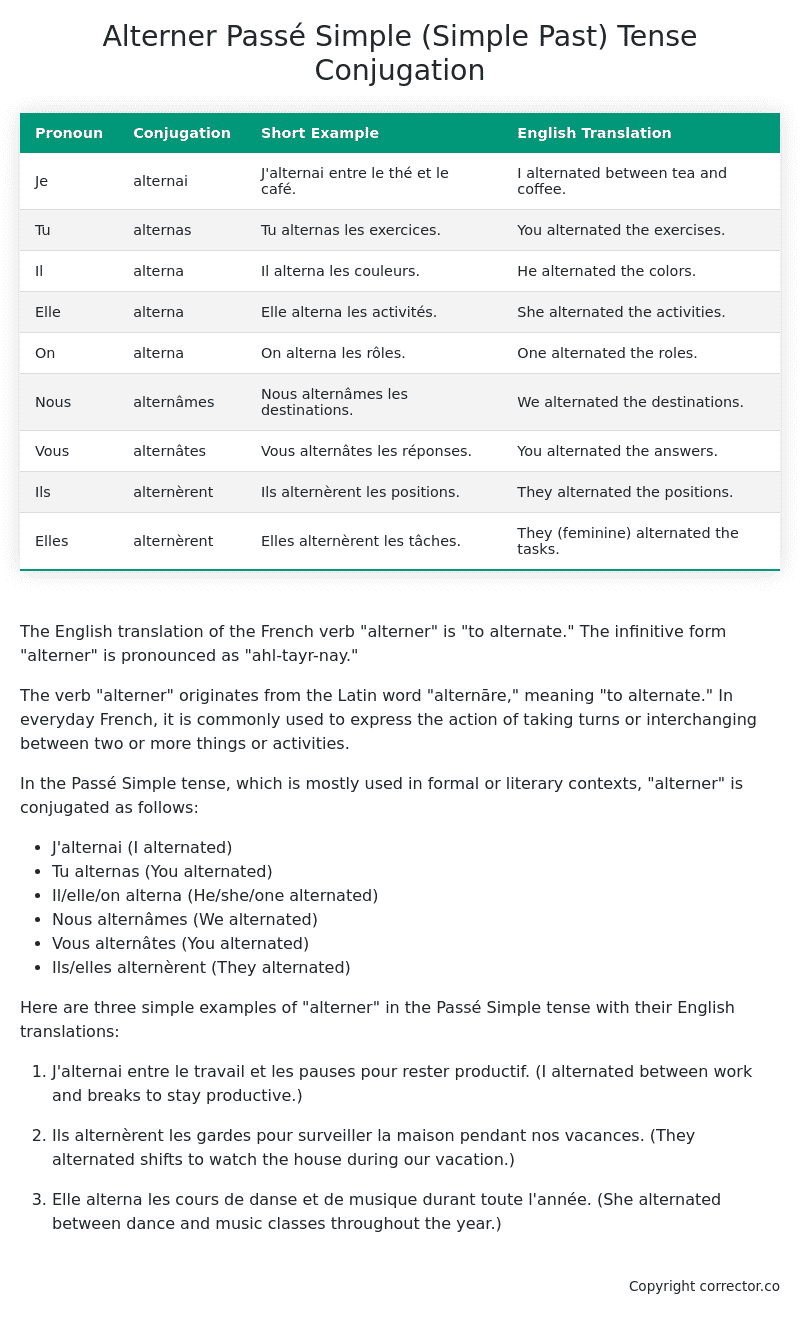Passé Simple (Simple Past) Tense Conjugation of the French Verb alterner
Introduction to the verb alterner
The English translation of the French verb “alterner” is “to alternate.” The infinitive form “alterner” is pronounced as “ahl-tayr-nay.”
The verb “alterner” originates from the Latin word “alternāre,” meaning “to alternate.” In everyday French, it is commonly used to express the action of taking turns or interchanging between two or more things or activities.
In the Passé Simple tense, which is mostly used in formal or literary contexts, “alterner” is conjugated as follows:
- J’alternai (I alternated)
- Tu alternas (You alternated)
- Il/elle/on alterna (He/she/one alternated)
- Nous alternâmes (We alternated)
- Vous alternâtes (You alternated)
- Ils/elles alternèrent (They alternated)
Here are three simple examples of “alterner” in the Passé Simple tense with their English translations:
-
J’alternai entre le travail et les pauses pour rester productif.
(I alternated between work and breaks to stay productive.) -
Ils alternèrent les gardes pour surveiller la maison pendant nos vacances.
(They alternated shifts to watch the house during our vacation.) -
Elle alterna les cours de danse et de musique durant toute l’année.
(She alternated between dance and music classes throughout the year.)
Table of the Passé Simple (Simple Past) Tense Conjugation of alterner
| Pronoun | Conjugation | Short Example | English Translation |
|---|---|---|---|
| Je | alternai | J’alternai entre le thé et le café. | I alternated between tea and coffee. |
| Tu | alternas | Tu alternas les exercices. | You alternated the exercises. |
| Il | alterna | Il alterna les couleurs. | He alternated the colors. |
| Elle | alterna | Elle alterna les activités. | She alternated the activities. |
| On | alterna | On alterna les rôles. | One alternated the roles. |
| Nous | alternâmes | Nous alternâmes les destinations. | We alternated the destinations. |
| Vous | alternâtes | Vous alternâtes les réponses. | You alternated the answers. |
| Ils | alternèrent | Ils alternèrent les positions. | They alternated the positions. |
| Elles | alternèrent | Elles alternèrent les tâches. | They (feminine) alternated the tasks. |
Other Conjugations for Alterner.
Le Present (Present Tense) Conjugation of the French Verb alterner
Imparfait (Imperfect) Tense Conjugation of the French Verb alterner
Passé Simple (Simple Past) Tense Conjugation of the French Verb alterner (You’re reading it right now!)
Passé Composé (Present Perfect) Tense Conjugation of the French Verb alterner
Futur Simple (Simple Future) Tense Conjugation of the French Verb alterner
Futur Proche (Near Future) Tense Conjugation of the French Verb alterner
Plus-que-parfait (Pluperfect) Tense Conjugation of the French Verb alterner
Passé Antérieur (Past Anterior) Tense Conjugation of the French Verb alterner
Futur Antérieur (Future Anterior) Tense Conjugation of the French Verb alterner
Subjonctif Présent (Subjunctive Present) Tense Conjugation of the French Verb alterner
Subjonctif Passé (Subjunctive Past) Tense Conjugation of the French Verb alterner
Subjonctif Imparfait (Subjunctive Imperfect) Tense Conjugation of the French Verb alterner
Subjonctif Plus-que-parfait (Subjunctive Pluperfect) Tense Conjugation of the French Verb alterner
Conditionnel Présent (Conditional Present) Tense Conjugation of the French Verb alterner
Conditionnel Passé (Conditional Past) Tense Conjugation of the French Verb alterner
Conditionnel Passé II (Conditional Past II) Tense Conjugation of the French Verb alterner
L’impératif Présent (Imperative Present) Tense Conjugation of the French Verb alterner
L’impératif Passé (Imperative Past) Tense Conjugation of the French Verb alterner
L’infinitif Présent (Infinitive Present) Tense Conjugation of the French Verb alterner
L’infinitif Passé (Infinitive Past) Tense Conjugation of the French Verb alterner
Le Participe Présent (Present Participle) Tense Conjugation of the French Verb alterner
Le Participe Passé (Past Participle) Tense Conjugation of the French Verb alterner
Struggling with French verbs or the language in general? Why not use our free French Grammar Checker – no registration required!
Get a FREE Download Study Sheet of this Conjugation 🔥
Simply right click the image below, click “save image” and get your free reference for the alterner Passé Simple tense conjugation!

Alterner – About the French Passé Simple (Simple Past) Tense
Formation
Usage
Narration
Historical Context
Interactions with other tenses
Passé Composé
Imparfait
Conditional and Subjunctive
Summary
I hope you enjoyed this article on the verb alterner. Still in a learning mood? Check out another TOTALLY random French verb conjugation!


